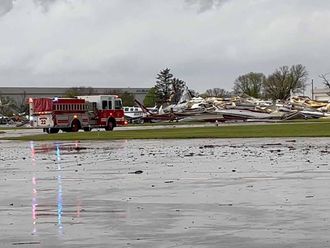CARACAS, Venezuela: With only 26 years of age, Jesus Casanova has already earned a degree in journalism, is the owner of a South American swimming championship and last year was crowned Mister Venezuela in this beauty-obsessed nation. Now he wants to add a new title to his achievements: congressman.
Along with a cadre of athletes, hip-hop artists and TV personalities, Casanova is one of several minor celebrities, most of them political novices, competing Sunday in primaries to select candidates for the ruling socialist party for December’s legislative elections.
Analysts say President Nicolas Maduro is counting on the fresh faces to court young, uncommitted voters at a time when support for his socialist administration is being eroded by widespread shortages and triple-digit inflation. His United Socialist Party, or PSUV, has mandated that half of its candidates be under the age of 30 to match the demographics of Venezuela’s 19 million voters.
“The polls show it. People want to see young, new faces, new projects and fresh ideas,” Casanova told The Associated Press as he wrapped up campaigning in the western city of Barinas.
More than 1,100 candidates are competing in Sunday’s vote, from which 110 of the candidates for the National Assembly’s 167 seats will emerge. The rest will be proposed by party leaders.
While there’s little politically distinguishing those running, turnout will be a key test of the PSUV’s electoral machinery.
With the opposition heavily favoured to take control of congress for the first time since the late President Hugo Chavez was elected 16 years ago, Maduro’s government is counting on its superior ground game to rally its base among the poor, especially in far-flung rural areas where the economic crisis is more severe but the opposition has little reach.
Pro-government candidates are also helped by near-complete socialist control of state institutions, a still-strong loyalty to the legacy of Chavez and the opposition’s scant access to television and radio.
In the last parliamentary election, in 2010, the ruling party failed to secure a majority of the popular vote but still retained nearly 60 per cent control of the legislature thanks to Venezuela’s complicated electoral math.
The opposition is also courting the youth vote” a third of candidates in its primaries last month were under the age of 40. If it takes control of congress, it’s likely to set the stage for a referendum to cut short Maduro’s presidency before his term ends in 2019.
Casanova goes by the nickname “The Triton of Sabaneta,” a reference to his prowess in the pool and roots in the same sun-baked village that was the birthplace of the late Hugo Chavez.
His father was a friend of the future Comandante growing up and Casanova says he wanted to enter politics from an early age to defend the poor.
“I always wanted to make this step but I never imagined it could be such a big one or happen so quickly,” he said. “Winning Mister Venezuela allowed me to occupy a space that nobody of my political ideology could have won.”
Getting elected won’t be easy, however. Casanova is up against some 20 candidates, including Argenis Chavez, one of the late president’s brothers.
Maduro has surrounded himself with celebrity candidates before, to mixed effect. In 2013 mayoral elections widely seen as plebiscite on his rule, former Major League Baseball all-star Magglio Ordonez prevailed in Puerto La Cruz. But pop star Antonio “El Potro” Alvarez lost a contest in the capital by a landslide despite a major media campaign.
The celebrity candidates this time around are lower-wattage stars. They include Pedro Blanco, a singer for “Dame pa’ matala,” a hip hop group popular in revolutionary circles whose name is a slang reference to smoking a joint. There’s also a young anchor from state TV.
Meanwhile Alvarez has stepped down as sports minister to run in the state of Miranda. Several other government officials with national name recognitions have also given up their posts to add some firepower to the PSUV slate.












